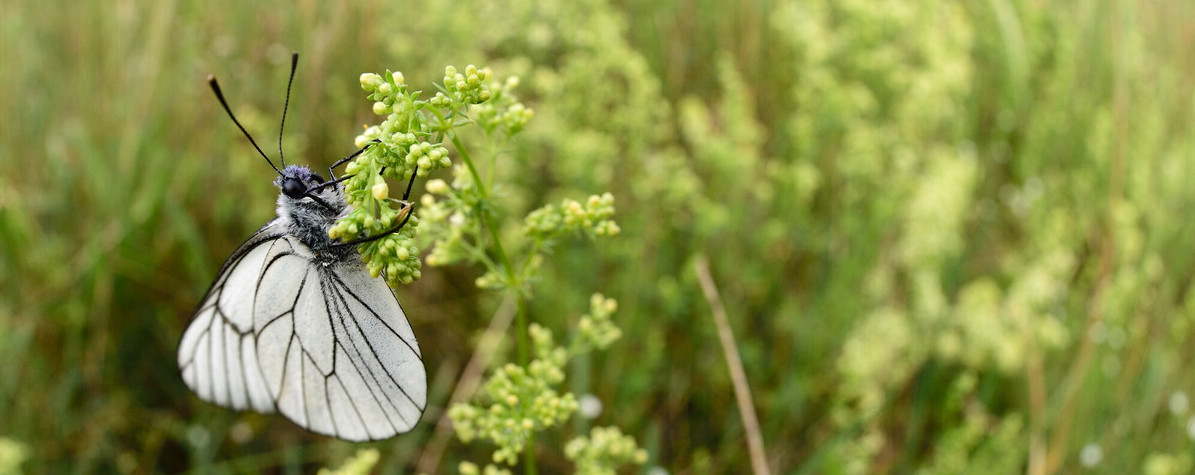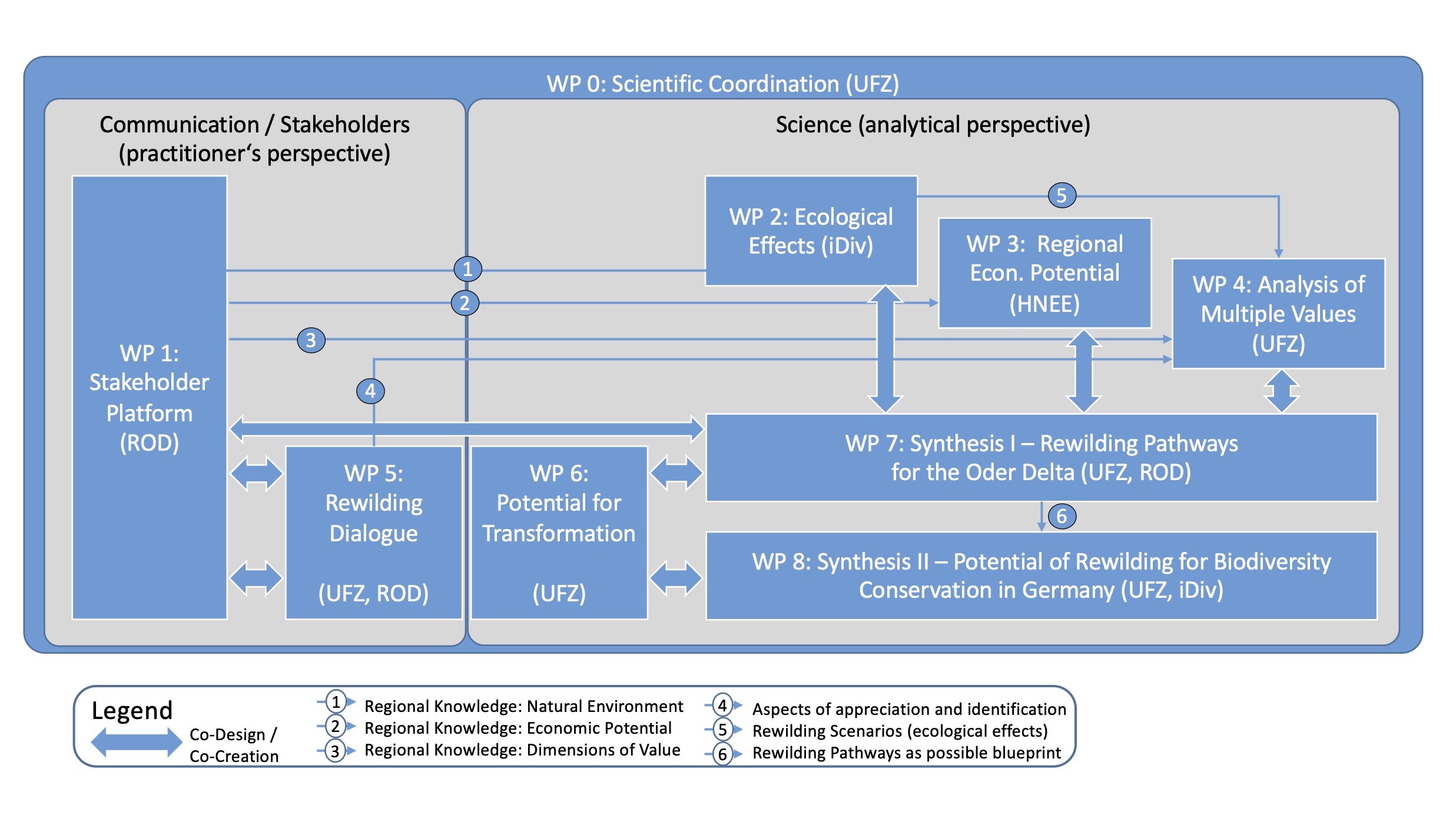
Work packages
In work package 1, a structured stakeholder platform is established to strategically engage all relevant project stakeholders and interest groups. The aim is to consider the perspectives of key stakeholders in the implementation of rewilding and to integrate them into the project work. Work package 2 focuses on the ecological consequences of rewilding processes, while work package 3 examines the regional economic potential of rewilding for sustainable economic development in the region. Work package 4 analyses the multiple dimensions of value associated with a place and its nature, and how they impact the appreciation of rewilding. Work package 5 develops and tests artistic formats that express local perceptions of nature while promoting appreciation and dialogue on nature conservation and regional development. Work package 6 addresses the societal transformation processes associated with the implementation of rewilding. Work packages 7 and 8 synthesize the developed methods and acquired knowledge. The collaboration of all work packages is supported by work package 0, which provides the scientific coordination of the whole project.
[Helmholtz Centre for Environmental Research, Leipzig - UFZ]
The objectives of the REWILD_DE project require an intensive inter- and transdisciplinary cooperation of scientists from the natural and social sciences together with practitioners in the model area Oder Delta. This includes both the conceptual development of rewilding in the context of cultural landscapes and a practical application in the case study area. Accordingly, the demands on the project coordination are extensive. They support the project team by moderating different perspectives and by providing different, respectively adapted exchange formats for mutual communication. Project controlling maintains the focus on the overall goal of the project, identifies obstacles and develops joint solutions. Another component of the work of the scientific coordination is the communication and reporting towards the funding body BMBF and the networking with the relevant scientific communities.
[Rewilding Oder Delta e.V. - ROD]
Participation is one of the core principles of rewilding and therefore plays an important role in the project REWILD_DE. In this work package, therefore, a concept for the intensive involvement of stakeholders in all work packages of the project will be developed and implemented. In doing so, we ensure that different perspectives are appropriately considered in the project and promote the understanding of and acceptance for rewilding in the Oder Delta model region and beyond.
Based on an analysis of regional and supraregional stakeholders, we aim to involve relevant interest groups. Within the project, a stakeholder engagement concept will be developed with the help of an external advisory board and a deeper stakeholder analysis will be conducted. The goal is to consider the perspectives of key stakeholders in the implementation of rewilding and to incorporate them into the project work. Conflicts of interest and use are not ignored, but moderated in a way that is independent of interests.
A local coordination office has already been set up in Glashütte near Rothenklempenow to act as a central point of contact for stakeholders and residents in the region.
[German Centre for Integrative Biodiversity Research, Halle - Jena - Leipzig - iDiv, Martin Luther University Halle-Wittenberg (MLU)]
Empirical evidence to assess the ecological consequences of rewilding processes is still scarce. Therefore, in WP 2 we want to establish a database on the structure of large mammal communities and their habitat relationships. We will also reconstruct the recent history of land management using historical information on land cover and land use change and find out how different management systems affect ecosystems. Finally, we want to develop participatory and model-based scenarios for biodiversity change and ecosystem services in the Oder Delta based on different restoration measures. The results can not only inform future management plans in the Oder Delta, but also provide useful guidance for nature conservation planning in Germany and the EU and for the development of nature-based economies.
[Eberswalde University for Sustainable Development - HNEE]
In addition to nature conservation activities, rewilding also aims to sustainably promote the economic development of a region. We are therefore investigating the economic potential that could result from rewilding or a more nature-based design of the landscape in the Oder Delta. For this purpose, businesses are identified that use selected nature-based areas themselves or profit from the use of the areas by third parties (e.g. tourism businesses). We analyse whether and which economic potentials result from rewilding for the enterprises. In addition, we look ahead and identify further economic activities associated with rewilding and determine which obstacles and funding opportunities exist for these nature-based business models.[Helmholtz Centre for Environmental Research, Leipzig - UFZ]
Nature contributes to human well-being in various ways, and the value of nature goes far beyond material aspects. Understanding the multiple dimensions of value associated with a place and its nature, and how these influence appreciation, is a prerequisite for deriving recommendations for action to implement rewilding.
[Helmholtz Centre for Environmental Research, Leipzig - UFZ & Rewilding Oder Delta e.V.]
The guiding question addressed by WP 5 is: How can nature conservation and regional development be sensibly thought together? What does it take for a region during transformation processes to develop a forward-looking identity in which nature conservation plays a role in the sense of rewilding?To explore these questions, we are developing and testing formats in WP 5 (interview walks and a photo exhibition on the human-nature relationship, landscape walks and a musical cultural programme) that promote trusting dialogue to overcome the mistrust that exists in parts of the population of Western Pomerania towards restrictive nature conservation.
The approach emphasises a questioning attitude. Starting from the question "What kind of landscapes do we actually want to live in?" the dialogue and communication formats are developed. Complementary to rational evaluation models, lifeworld forms of appreciation (emotional access, identification with special places or creatures in the landscape, historical links, personal experiences with the landscape and its changes) are addressed. Furthermore, artistic approaches can promote communication and understanding of other perspectives. In this way, AP 5 complements usual ways of knowledge transfer and stakeholder participation.[Helmholtz Centre for Environmental Research, Leipzig - UFZ]
Using qualitative social research methods, we are investigating processes of social change associated with an implementation of rewilding in the Oder Delta. At the beginning of the project, interviews will be conducted with local stakeholders on how they perceive their landscape in the Oder Delta and what development potential they see. During the project, the implementation of rewilding in a selected project community will be accompanied. At the end of the project, possible changes in the attitudes of the stakeholders will be assessed. This enables conclusions to be drawn about which strategies contribute to understanding and support for rewilding measures.
[Helmholtz Centre for Environmental Research, Leipzig - UFZ & Rewilding Oder Delta e.V. - ROD]
In a conversation between scientists and local practitioners, WP7 aims to build development ideas through rewilding for the Oder Delta model region. In doing so, we will address the question of the role that rewilding in the Oder Delta can play both for the protection of biodiversity and for the holistic development of the region. Success factors and obstacles of rewilding will be identified and reflected upon together with the local actors. The final product is a jointly developed rewilding vision for the region, which not only identifies opportunities through rewilding, but also considers limits and risks. We consider this to be an essential contribution to regional identification with and long-term implementation of rewilding in the Oder Delta.
[Helmholtz Centre for Environmental Research, Leipzig - UFZ & Centre for Integrative Biodiversity Research, Leipzig, Halle, Jena - iDiv & Martin Luther University Halle-Wittenberg (MLU)]
In this work package we investigate to what extent the implementation concepts for the Oder Delta model area can be transferred to other areas in Germany. For this purpose, the special features of the Oder Delta are reflected, success factors and obstacles for rewilding are elaborated and evaluated regarding their transferability. We analyse what distinguishes rewilding from other established forms of nature conservation (e.g. in national parks or biosphere reserves). We will discuss our results at a workshop with nature conservation experts (from nature conservation authorities, administrations, ministries, environmental and nature conservation associations, representatives of protected areas and tourism associations) to assess the potential of rewilding for other areas in Germany.


